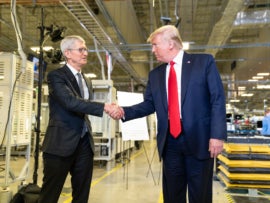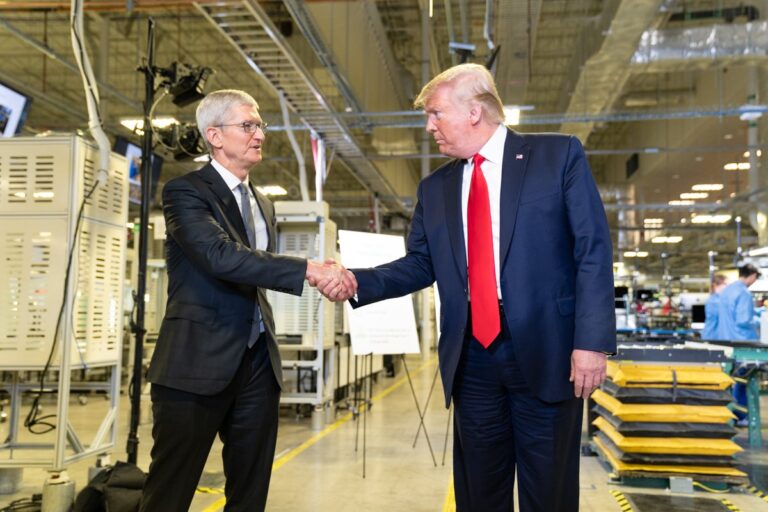
US President Donald Trump’s fondness for Tim Cook is souring. He took several jabs at Apple’s chief executive during his recent tour of the Middle East, likely stemming from his resistance to shifting iPhone production out of China.
When Trump announced sweeping “reciprocal” tariffs on all countries with which the US runs a trade deficit, his goal was to push companies like Apple to shift their manufacturing to American soil. The tech giant has instead planned to develop alternative sites in India and Vietnam as well as increase production in countries outside of China.
To add insult to injury, Cook declined an invitation to join Donald Trump in the Middle East, according to The New York Times.
“Tim Cook isn’t here, but you are,” he said to Nvidia CEO Jensen Huang during a speech in Riyadh. Later, in Qatar, the president remarked that he “had a little problem” with the Apple exec because he doesn’t want Apple “building in India.”
SEE: Amazon, AMD Launch Multibillion Dollar AI Projects in Saudi Arabia
On May 23, Trump threatened to impose a 25% tariff on all iPhones manufactured outside the US. This marked a significant reversal from the administration’s earlier stance, which had granted temporary reciprocal tariff exemptions for smartphones, computers, semiconductors, and other electronics — a decision largely attributed to lobbying efforts by Cook himself.
“President Trump has been consistently clear about the need to reshore manufacturing that is critical to our national and economic security, including for semiconductors and semiconductor products,” Kush Desai, a White House spokesman, told The New York Times. He added that the administration “continues to have a productive relationship with Apple.”
When it comes to Trump, Cook wants peace, not problems
Cook, whom Trump has jokingly called “Tim Apple,” has maintained a close relationship with Trump since his first term in office.
In 2019, the president said the Apple chief was a “great executive because he calls me and others don’t,” according to CNBC. That same year, Cook gave Trump a tour of an Apple contractor’s Texas plant, operational since 2013, after which Trump falsely claimed he had just opened a major Apple factory. Cook didn’t correct him.
It doesn’t appear that Cook wants to lose their rapport. After Apple’s shareholders declined a conservative-backed proposal to dismantle its diversity, equity, and inclusion programme — an initiative that some industry peers scaled back to align with the administration — Cook acknowledged the company might still need to make certain adjustments.
Apple has also presented the idea of relocating a portion of its manufacturing to the US; some of Apple’s chips are currently made in Arizona and other US states. In February, the company committed $500 billion over the next four years to domestic infrastructure and initiatives, including the US Advanced Manufacturing Fund, which aims to train potential workers. A Houston manufacturing facility will build artificial intelligence servers for Apple Intelligence.
This effort benefits Apple, which has sought to reduce its dependence on China since factory shutdowns and other supply chain disruptions severely impacted its ability to meet global demand during the COVID-19 pandemic. Still, it is extremely unlikely to move iPhone production from India to the US, as doing so could drive up the cost of a device to $3,500.
Trump’s tariff threat is the tip of the iceberg for Apple’s woes
Apple has not had an easy ride lately, and Cook’s fraught relationship with the US president is just the tip of the iceberg. Last week, OpenAI announced it was partnering with Apple’s former chief design officer, Jony Ive, on a new piece of AI hardware that could rival the iPhone, raising concerns within Cupertino.
Apple is facing pressure to innovate. Rivals like OpenAI, Google, and Microsoft are nipping at its heels with vast AI investments, while Cook’s company continues to prioritise upgrading its existing offerings. Rumours suggest that Apple will not be making any major AI-related announcements at June’s Worldwide Developer Conference, and that its long-promised AI-augmented Siri may be delayed until 2026. Its most ambitious AI project, augmented reality glasses, is also expected to debut in late 2026.
SEE: Tim Cook’s Obsession with AR Glasses Shapes Apple’s Vision Pro Roadmap
The company has been, and continues to be, embroiled in numerous legal battles. One of them relates to the fact that Apple allegedly misled buyers with promises of AI features for Siri that are yet to materialise. Last month, a judge ruled that Apple had broken a court order by charging a 27% fee on off-app purchases.
Released two years ago, the Vision Pro headset has reportedly been a disappointment to Apple, struggling to gain traction with customers due to its large size and the $3,499 price tag. Some consumers also reported headaches and eye strain. Compounded by a slowdown in the Chinese market, these factors have led to Apple falling from the world’s largest company to third place in terms of market capitalization.

